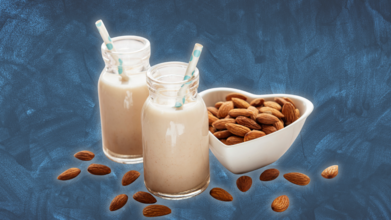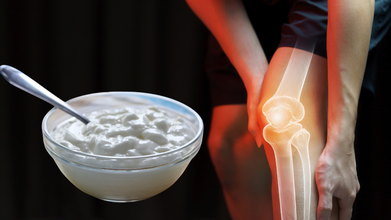- Health Conditions A-Z
- Health & Wellness
- Nutrition
- Fitness
- Health News
- Ayurveda
- Videos
- Medicine A-Z
- Parenting
- Web Stories
National Nutrition Week 2025: What Happens To Your Body When You Drink Almond Milk Everyday?

Credits: Health and me
From roasted almond handfuls as a snack to almond flour in gluten-free cooking, this nut has become a staple in daily diets and when discussing nutrition, almonds nearly always find their way onto the list. With their high levels of healthy fats, antioxidants, and vitamins, this little nut has been touted as a superfood for a long time. But over the past decade or so, almonds have come in a new guise that has appeared in millions of kitchens across the globe—almond milk. Almond milk is creamy, dairy-free, and frequently fortified with important nutrients. It's become the first choice for those who'd rather not indulge in regular dairy.
National Nutrition Week is annually celebrated from September 1 to 7, and it acts as a reminder to take stock of how our diet contributes to our well-being. The theme for 2025, as in the past, is all about balanced diets, nutrient-dense foods, and bringing awareness to silent nutritional deficiencies. Almond milk is perfectly a part of this discussion. Whereas plant-based diets are on the rise due to environmental, ethical, and health considerations, you need to know whether substituting dairy with almond milk is boosting or detracting from your long-term health. What does actually happen when you consume it daily? Is it a good habit—or does it have some secret downsides you should find out?
Also Read: Even 'Minimal' Portion Of Ultra-processed Foods Sabotage Male Fertility And Metabolism
Smooth in texture and nutty in taste, almond milk is now being poured into lattes, blended into smoothies, and stirred into cereal bowls as a substitute for cow's milk. But with so much hype, the question is, is drinking almond milk daily really good for you, or are there unsuspected downsides to be on the lookout for?
Cow's milk has been the default choice for generations—be it for dipping cookies, stirring into oatmeal, or frothing for coffee. However, almond milk sales in the United States have continuously increased year after year, based on figures from the U.S. Department of Agriculture. Although the total effect on dairy sales is still modest, the trend demonstrates shifting consumer values. Individuals are moving to almond milk for a number of reasons:
- Some prefer a vegan or eco-friendly option.
- Others are lactose intolerant or have a dairy allergy.
- And some just like the lower calorie count or milder taste.
Almond milk is dairy free, vegan friendly, and is commonly fortified with calcium and vitamin D, making it a popular replacement. However, its nutritional content is not the same as cow's milk, and that difference holds weight when partaken in every day.
What Exactly Is Almond Milk?
Even though almonds are in the name, almond milk is not created through "milking" almonds. Almonds are soaked, then blended with water and strained to remove a smooth liquid from them. It can be sweetened, flavored, or fortified with vitamins and minerals based on the brand.
Its natural state is quite low in calories, protein, and sugar, but commercial fortification adds extra nutrients such as calcium and vitamin D, which are otherwise available in cow's milk.
Health Benefits of Drinking Almond Milk Every Day
A Boost of Antioxidants
One of the standout nutrients in almond milk is vitamin E, an antioxidant. One cup yields almost half of the recommended daily amount. Vitamin E protects cells from oxidative stress, maintains immune function, and has been associated with cardiovascular health.
Supports Weight Management
Unsweetened almond milk is about 37 calories per cup—far less than dairy milk. For those who want to lose or maintain weight, no need to sacrifice milk in the diet by substituting with almond milk that can help them without compromising calorie targets. Its minimal amount of healthy fats, particularly monounsaturated fats, also contribute to satiety.
A Solution for Lactose Intolerance
For those who can't digest lactose, almond milk provides a relief-filled solution. Unlike dairy, it's lactose-free by nature, skipping the gas and bloating that go along with regular milk.
Bone Health Potential
Fortified almond milk can deliver similar levels of calcium and vitamin D as cow's milk—two nutrients that are key to bone strength and osteoporosis prevention. On its own, though, almond milk lacks in this regard.
Blood Sugar-Friendly
Unsweetened almond milk has only 1 gram of sugar per serving, so it's a great choice for diabetics. It won't trigger the same blood sugar spikes that result from sweetened versions or dairy milk occasionally.
Eye and Immune Support
Due to its vitamin A content, almond milk promotes healthy vision as well as immune system strength, so it's more than a mere coffee cup filler.
Nutrition Breakdown
A comparison reveals how almond milk compares to cow's milk per cup:
- Calories: 37 in unsweetened almond milk vs. 122 in dairy milk.
- Protein: 1 g in almond milk vs. 8 g in dairy milk.
- Calcium: Up to 422 mg in fortified almond milk vs. 309 mg in dairy milk.
- Vitamin E: 8 mg in almond milk vs. negligible in dairy.
The most significant distinction is protein. Milk is much more nutrient-dense in this area, which has a primary function in muscle building, endocrine function, and overall energy state.
Possible Risks of Drinking Almond Milk Daily
Consuming almond milk every day is perfectly safe for the average adult, but it comes with some provisos.
Added Sugars: Sweet almond milk is high in sugar, which can increase obesity, heart disease, and type 2 diabetes risk. Opting for unsweetened is crucial.
Low Protein: Even fortified almond milk is a lot lower in protein than dairy. People living only on almond milk will have to get protein elsewhere.
Additives: Some products include carrageenan, an additive associated in some research with inflammation of the digestive tract. Most individuals can tolerate it, but those who are sensitive must be careful.
Infants and Toddlers: Almond milk is not safe for children under one year old because it does not have the fat, protein, and nutrients needed for growth. Pediatricians advise using only breast milk or formula until age one.
Nut Allergies: For almond-allergic individuals, even small quantities are potentially fatal.
Who Should and Shouldn't Consume Almond Milk Daily?
Almond milk can be a good option for lactose-intolerant adults, vegans, or those watching their calories. But it's not suitable for babies, individuals with nut allergies, or those who are constantly dependent on milk as an important source of protein without making up for it elsewhere.
Creative Ways to Drink Almond Milk Everyday
Aside from pouring it into breakfast cereal, almond milk can quite easily become a staple in a daily diet:
- Blended into smoothies and protein shakes.
- Substituted into recipes for baked goods such as cakes or muffins.
- Mixed into soups or sauces for added creaminess.
- Used as a base for overnight oats or chia puddings.
Homemade almond milk, prepared by soaking and blending almonds with water, can also be a fresher, additive-free alternative though it will not contain the same fortified nutrients as store-bought options.
Should You Have Almond Milk Every Day?
Almond milk is not an ideal replacement for dairy milk, but it provides distinct advantages. Having unsweetened, fortified almond milk daily may complement antioxidant consumption, bone density, and calorie control and is also a good choice for lactose intolerant or vegan diets. Its principal disadvantages are its poor protein content and potential risks associated with added sugars in flavored types.
Disclaimer: This article is for informational purposes only and should not replace professional medical advice. Always consult a healthcare provider before making changes to your diet or nutrition habits.
Is Bubble Tea Putting Your Health at Risk? Experts Warn About Lead Exposure

Credits: Canva
A trendy drink that’s become a social media favorite may now have fans thinking twice, after questions were raised about one key ingredient.
Bubble tea, also called boba or pearl milk tea, first appeared in Taiwan in the 1980s. It’s usually made with tea, milk or creamer, a sweetener, and, of course, the signature chewy tapioca pearls.
While its colorful, Instagram-worthy appeal has made it popular around the world, recent safety tests from Consumer Reports suggest there could be reason for concern.
Boba Tea Contains Lead?
Bubble tea, the Taiwanese drink made of black tea, milk, sugar, and chewy tapioca pearls, has won fans worldwide since its debut in the 1980s. But recent findings suggest it may deserve a closer look.
A Consumer Reports investigation in the US found high lead levels in some bubble tea products, echoing earlier concerns about cassava-based foods. The tapioca pearls, the drink’s signature “bubbles,” are made from cassava starch, which can absorb lead and other heavy metals from the soil as the plant grows.
Why Are Tapioca Pearls Harmful?
Lead is naturally present in the Earth’s crust, and much of the world’s soil contains significant contamination. Many fruits and vegetables, including cassava, can absorb heavy metals during growth.
Consumer Reports tested tapioca pearls from popular bubble tea chains, Gong Cha and Kung Fu Tea, as well as packaged boba products from Trader Joe’s and WuFuYuan. Every sample contained some lead. Thankfully, none exceeded the levels that Consumer Reports considers concerning, and none had dangerous levels of arsenic, cadmium, or mercury in a single serving.
“These levels weren’t high enough for us to advise people to completely avoid bubble tea,” said James E. Rogers, PhD, director of food safety research and testing at Consumer Reports.
“However, this wasn’t a comprehensive survey of the boba and bubble tea market. The fact that three out of four samples contained more than half of our level of concern for lead in a single serving is a strong reminder that bubble tea should be enjoyed occasionally, rather than as an everyday drink.”
Beyond heavy metals, the starchy composition of tapioca pearls can pose other risks. Eating large amounts may slow stomach emptying, a condition called gastroparesis, or even cause blockages. Symptoms can include nausea, vomiting, and abdominal pain, and people with already slow digestion may be particularly affected.
Bubble Tea and Kidney Health
Bubble tea can also impact kidney health. In 2023, Taiwanese doctors removed more than 300 kidney stones from a 20-year-old woman who reportedly drank bubble tea in place of water. Ingredients such as oxalate and high phosphate levels can contribute to stone formation, though this extreme case likely reflects unusually high consumption.
Jason Tsou, General Manager at WuFuYuan’s parent company, Shanghai ZhouShi Foodstuffs, said the company routinely tests its products for lead through an accredited laboratory. Following these recent findings, they have introduced stricter standards to ensure safety, as per New York Post.
Can L-Theanine Really Make You Focus Better? What Science Says About the ‘Calm but Alert’ Effect

Credits: Canva
If you often struggle with stress or restless nights, a warm cup of tea is likely your go-to for calming down. Tea’s comforting reputation isn’t just tradition, studies suggest it can support heart health, aid digestion, and more. One key component behind these benefits is L-theanine, an amino acid found in tea leaves. Available as a supplement, L-theanine is thought to help reduce anxiety, improve sleep, and even enhance focus.
It is gaining popularity as a supplement for enhancing focus and relaxation. But does it live up to the hype? Here's what recent research reveals about its effects on attention, reaction time, and cognitive performance.
What Is L-Theanine?
L-theanine is an amino acid naturally found in tea leaves, especially in green tea and loose-leaf varieties, and is believed to offer several health benefits. But first, it helps to understand what amino acids are and why they matter.
Amino acids are the building blocks of proteins and, ultimately, life itself, as per Healthline. They are molecules used by all living organisms to make proteins. Humans need 20 different amino acids to function properly, 11 of which are essential and must come from food.
Although L-theanine is not essential for survival, research has explored its effects on brain function and cognitive performance.
You can consume L-theanine by drinking teas such as green tea, white tea, or matcha, or by taking it in supplement form, including tablets and capsules.
Can L-Theanine Really Make You Focus Better?
Yes, several studies suggest that L-Theanine can enhance focus and attention. For instance, a 2011 study published in ScienceDirect found that L-Theanine improved attention performance and reaction time in individuals prone to high anxiety.
Additionally, a 2021 study in PubMed Central reported that a single dose of L-Theanine reduced reaction time to attention tasks and increased the number of correct answers in working memory tasks among middle-aged adults.
PMC
L-Theanine appears to have a positive impact on reaction time. A 2025 study published in PubMed found that a 200 mg dose of L-Theanine reduced hit reaction time by 38.65 milliseconds in sleep-deprived individuals during a traffic-related visual recognition task.
PubMed
L-Theanine Effect with Caffeine
When combined with caffeine, L-Theanine may offer enhanced cognitive benefits. A 2010 study in PubMed indicated that the combination of 97 mg of L-Theanine and 40 mg of caffeine improved accuracy during task switching and reduced self-reported tiredness in young adults.
PubMed
L-Theanine: Is It Safe to Use?
L-Theanine is generally considered safe when consumed in moderate amounts, such as those found in tea or supplements. However, as with any supplement, it's advisable to consult with a healthcare provider before starting, especially if you have underlying health conditions or are taking other medications.
L-Theanine shows promise as a natural supplement to enhance focus and reaction time, particularly when combined with caffeine. While more research is needed to fully understand its long-term effects, current studies suggest it can be a useful tool for those seeking improved cognitive performance without the jitteriness associated with other stimulants.
Disclaimer: The information provided is based on current research and should not replace professional medical advice.
Is Yogurt as Good for Your Bones as It Is for Your Gut?

Credits: Canva
We have been often told that milk, and dairy products are great for our bone health, especially due to its high vitamin D and calcium components. This is also true for yogurt, but is there enough evidence to support this argument? A new study published in the journal Frontiers in Nutrition checks exactly take. It has taken a closer look at the question of eating yogurt to improve bone health. While the findings may show promise, the researchers say that evidence is not strong enough to call yogurt a bone-strengthening food on its own.
Why yogurt Is Believed To Be Bone Healthy?
yogurt is made through fermentation of milk, and it uses two specific bacterial strains, namely: Lactobacillus delbrueckii bulgaricus and Streptococcus thermophilus.
While yogurt and milk share similar nutrient profiles, yogurt offers additional benefits due to the above mentioned bacteria. They also produce vitamins and biologically active compound that could support overall health.
When we age, our bones lose mass and bone formation slows down, while resorption or bone breakdown speeds up. This also increases risk of fragility fractures. This is why nutrients like calcium, vitamin D, phosphorus, and potassium play vital role in maintaining strong bones. yogurt is also rich in protein, calcium, zinc, selenium, and vitamin B and K which is also recommended as bone-friendly food.
Some experts also believe that yogurt offers an edge over milk due to the higher levels of certain vitamins and minerals it provides. Furthermore, they claim that there is a better absorption of nutrients through yogurt. However, despite this theory, the studies have only shown mixed results.
How Was the Study On yogurt's Impact On Bone Health Conducted?
For the latest study, the researcher reviewed the existing evidence on yogurt's impact on bone health. The study analyzed data from scientific databases, including PubMed, Cochrane Library, and Scopus. These were published between 1970 to 2023.
The team had both the groups, namely: healthy adults and individuals with osteoporosis. The study included a comparison of yogurt intake to no yogurt, non-fermented dairy products, or standard osteoporosis treatments. Then, they evaluated observational studies and randomized controlled trials (RCTs), extracting data on participants’ demographics, yogurt dosage, study duration, and results.
In order to ensure accuracy, the study also assessed the quality of evidence using established methods such as the Newcastle-Ottawa scale and the GRADE system. Finally, they conducted meta-analyses to evaluate two major outcomes, hip fracture risk and femoral bone mineral density (BMD).
What Did The Study On Analyzing yogurt's Impact On Bone Health Find?
The study found that of the 1,302 studies reviewed, only 12 met the eligibility criteria that represented 14 observational studies. Most of them were conducted in the US, Europe, and Asia, and focused on postmenopausal women, a group that is particularly vulnerable to bone loss.
There were some studies that found a relation between higher yogurt consumption to better bone mineral density. On fact, one of them even reported that people who consumed yogurt more frequently had a lower risk of radius osteoporosis and higher hip and femoral neck BMD levels.
However, when researchers pooled the data, the overall effect was quite small. The meta-analysis showed that yogurt intake had a statistically positive but clinically negligible impact on bone density (SMD = 0.009) and no clear association with hip fracture risk.
The team also noted several limitations. Most studies didn’t specify the type of yogurt consumed, whether it was full-fat or low-fat, fortified or plain, or contained live bacterial cultures. Since all the data came from observational studies, it was also hard to prove a cause-and-effect link between yogurt and stronger bones.
© 2024 Bennett, Coleman & Company Limited

